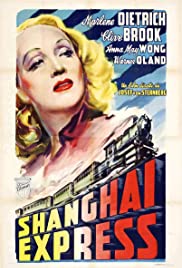She is getting insistent offers of marriage from an Egyptian royal and is thinking of taking him up, until a terrified servant hands her a telegram informing her that her tony East-Coast Grandmother is deathly sick, and she flies out of the house trailed only by all the servants who have had to pack her bags. Once aboard the train she finds to her chagrin that she is not the only celebrity that the crowds of press and fans are gathering to see off. The other one is famous writer of adventurous travelogues "Anthony Amberton" (in reality John Smith), who is of course played by Henry Fonda, acting a good deal less inert and clueless than in his classic screwball outing The Lady Eve. He is informed that not all of the fuss (which he hates) is about him, and, on finding out Cherry Chester ("is that some kind of soft drink?") is aboard, launches into a screed about Hollywood actors. Despite being in adjacent cabins on the train, the two manage not to meet, however.
(Jami swears this is the earliest film in which the leading lady does something so undignified as brushing her teeth and gargling, but I don't think so. Perhaps you, dear reader, can settle this.) On reaching New York, she goes to her Granny's (palatial) house to discover, of course, that her Granny, who is clearly the source of her entitled behavior, is fine, but wanted her back because she got wind of the Egyptian and wanted her to drop this acting nonsense and marry her cousin Horace. Meanwhile, he is in New York to promote his latest work, which involves book signings, which, of course, he hates. There's various shenanigans where we meet Horace (who is twelve years older than Sarah and sort of a dimmer version of an American Bertie Wooster) and we see a battle of wills between Sarah and her grandmother, and we also discover that John is deathly allergic to "Cherry's" signature perfume ("Cherry Blossom," natch) because of an incident involving musk in an African village, or so he claims. While he is getting some fresh air outside the store where he was both book-signing and exposed to the perfume,
he is spotted by a hoard of his (rabid female) fans who chase him down the street. He escapes by hopping through traffic, of course ending up in the carriage (her Grandmother's staff are very old-fashioned) of Sarah.
She is shocked to find that he doesn't recognize her, and he equally so, and they both talk about how they long to escape New York and all these people to the wilderness. He leaves suddenly (he remembers an appointment) but leaves behind a card of the boarding house off in the wilds of New England, which gives her the idea to escape both her Grandmother and her marriage plans and her exhausting Hollywood lifestyle. And so she does, expecting to surprise him, but rather disgruntled to discover that he expected her. Still, they spend an idyllic few days in a snow-bound little B&B run by Margaret "Wicked Witch" Hamilton and her husband, and with Walter "stereotypical Old Prospector" Brennan as the coachman. In fact, it is so idyllic that they get married on a whim, but on the wedding night John is exposed to her perfume and his reaction so enrages her that she departs back to New York, and is soon engaged to be married to Horace. Will John track her down? Will they ever work out that the other is as famous as they are? Will the finale involve John practically abducting Sarah, complete with straitjacket? Watch it and see (but you'll have to buy the DVD because it's not streaming anywhere, as far as I can see).
Jami remarked that this wouldn't have worked with any other actress, and there's something in that. "Cherry" certainly acts like a spoiled brat, and it's only Sullavan's ease in switching between aggrieved and breezy that prevents one souring on her. In fact, truth be told, I don't hold up much hope for the marriage, as both of them are fairly insufferable, and perhaps that's the Dorothy Parker influence. Still, both are charming, and the supporting characters are all reliable veterans who make the film breeze past very satisfyingly.




































